
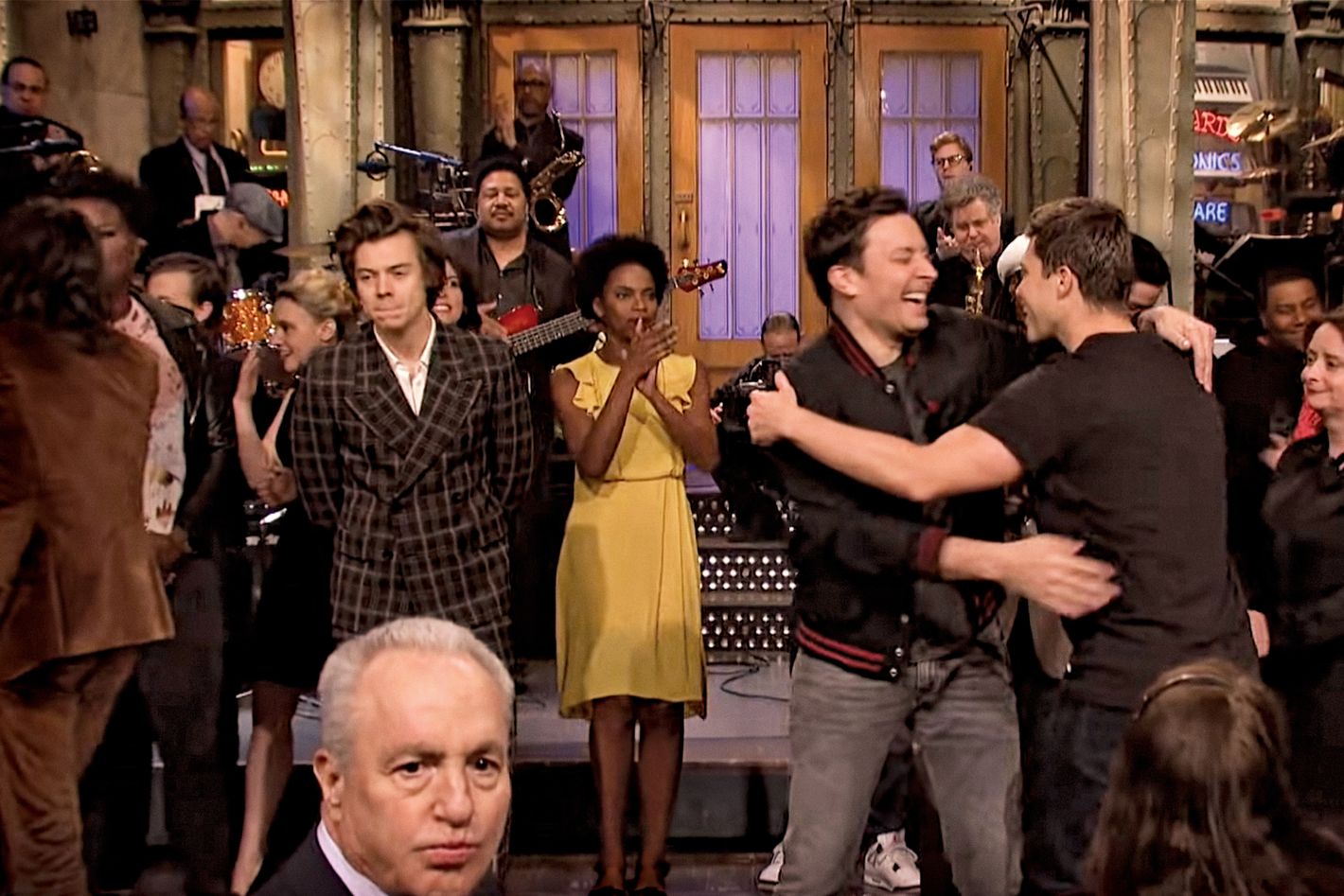
Lorne Michaels has a rule, whenever he finishes another long season of Saturday Night Live, to take off the month of June. He might go to his home in Amagansett, or the blueberry farm he owns in Maine, and usually to Europe, where last summer he had a few work obligations in the middle of his break. In London, he stopped by the Savoy Theatre to pose on the red carpet with Tina Fey at the British premiere of Mean Girls the musical, which he produced, and made time for dinner at the River Cafe with Jimmy Iovine, Paul McCartney, Dr. Dre, and Bruce Springsteen, who was in town to play Wembley Stadium. During dinner, Iovine told a story about how, in 1975, when Michaels was gearing up for SNL’s launch, Iovine was a few blocks away at the Record Plant studio working with Springsteen on Born to Run.
After that, it was on to Paris in July, for the Olympics, which NBC was using as a soft launch for its extravagant run-up to the 50th anniversary of SNL, Michaels’s fiefdom since its founding. Michaels went to see Simone Biles in the women’s team-gymnastics final — a comedy GOAT watching an aerial one — and ran into his longtime friend Mick Jagger at a party hosted by LVMH. At some point, Michaels decided to try to get Springsteen to mark 50 years of Born to Run by performing at SNL’s 50th-anniversary blowout, which is happening the weekend of February 14. So when Steven Spielberg called to see if Michaels might join him on his boat in the south of France, where he was tooling about with Bono, the Edge, and Springsteen, Michaels, ever the producer, decided to seize the moment: He asked Spielberg to coax Springsteen into playing the show, invoking his other rock-and-roll friend to convince him. “Well, you know, Mick and I both think he should do it,” Michaels said.
This 50th season of SNL has been a yearlong reminder of the influence that Michaels continues to exert not only over his show and the galaxy of comedians, musicians, and A-listers who have been drawn into its orbit but also over the power brokers and institutions that govern the world of entertainment from New York to Hollywood. This season, he brought in a conveyor belt of SNL family members to play Kamala Harris (Maya Rudolph), Joe and Hunter Biden (Dana Carvey and David Spade), Robert F. Kennedy Jr. (Alec Baldwin), and Doug Emhoff (Andy Samberg) and invited John Mulaney and Martin Short and Chris Rock — SNL stars from three different decades — to come back as hosts. An NBC executive recently called an old colleague to complain about the exorbitant expenses Michaels was accruing. “I told them, ‘Just agree to this; otherwise, Lorne is gonna have to call whoever Lorne calls,’” the former executive said. “Even today, people are confused by the chain of command at NBC. Just look at the org chart: Lorne looms slightly off the chart and above us all.”
SNL has been long derided as middling middlebrow entertainment, a show well past its prime. But thanks to Michaels, it has also endured in a way nothing else has. Even in its current, supposedly diminished state, it is the highest-rated entertainment show on broadcast TV — ahead of anything in prime time that isn’t football. SNL remains consistently profitable despite being incredibly expensive to produce, and clips from last season were viewed 3.1 billion times, making it, with apologies to the Bachelor franchise, the most culturally relevant product on network TV today.
And SNL is only one part of the Lorne Michaels Extended Universe. The show has spawned beloved television series (30 Rock) and movie franchises (Wayne’s World) along with a seemingly endless crop of comedy writers and performers who have used SNL as a passage to stardom. For the past decade, Michaels has also produced the rest of NBC’s late-night lineup, installing SNL alums Jimmy Fallon and Seth Meyers as hosts of The Tonight Show and Late Night, which means that Michaels now controls NBC’s late-night airwaves from Monday through Saturday. That leaves only Sundays for rest — fitting for a comedy god.
Planning for the 50th anniversary, which will begin with a concert at Radio City Music Hall on February 14 and conclude with a show in Studio 8H at 30 Rockefeller Plaza on February 16, started more than two years ago. “It will be emotional, but everyone will show up because it’s important,” Michaels said when he announced it at Cannes. Well, not everyone: The Boss has so far resisted Michaels, although McCartney, Tom Hanks, Sabrina Carpenter, and Bad Bunny are filling out the lineup. And despite all the hype, the anniversary seems to be coming together as SNL does every week — at the last minute. Several old SNL hands have recently been called back to duty. “I just finally agreed to do it today, mostly so I can get a ticket for my girlfriend,” Jim Downey, a former SNL writer of 30 years, told me in January. Another longtime staffer, Ken Aymong, who managed SNL’s budget and production for 38 years, retired in 2021 at 71 years old. “It was just time,” he told me. But Michaels called on him to work on the anniversary anyway. “Lorne called me, and he just goes, ‘So this is what we’re doing for the 50th,’ and he keeps talking,” Aymong said. “And before I got a chance to say anything, he says, ‘I gotta run.’” If the show matches previous SNL anniversary specials — 26.5 million people tuned in for the 40th — it will be the most-watched non-football event on TV this year.
No one else could pull off a spectacle so monumental, owing in large part to the mix of loyalty, admiration, and fear Michaels has instilled throughout the ranks of Hollywood royalty. (Last year, Ariana Grande said calling Michaels to ask if Bowen Yang could take time away from SNL to play a supporting role in Wicked was “the most nervous I have ever been.”) The closest analogue might be Anna Wintour, who has been running Vogue for 36 years. “When I saw The Devil Wears Prada, I broke out into a cold sweat,” a person who worked with Michaels told me. “That’s literally how you felt: I can’t possibly satisfy this person’s expectations.”
But Michaels turned 80 this past November, in the middle of an SNL episode hosted by Charli XCX, which makes him just two years younger than Joe Biden. His age has added an undercurrent of queasiness to the 50th-anniversary victory lap as Michaels’s empire rolls on without a firm succession plan. For better or worse, the machinery of American comedy has built up around him, and no one knows how the laugh factory will function if Michaels retires — or what it means if he chooses to cling to the show into his twilight years. Besides, who could replace him? Who will try to cajole Springsteen one day and bully NBC executives the next while managing the fragile egos of comedians and taking the ultimate measure of whether SNL is funny or not? The longer Michaels keeps going, the more singular he becomes, even as he drifts into a situation that has trapped so many before him. As Michaels himself has said, “You know when people leave show business? Never. No one ever leaves show business.”
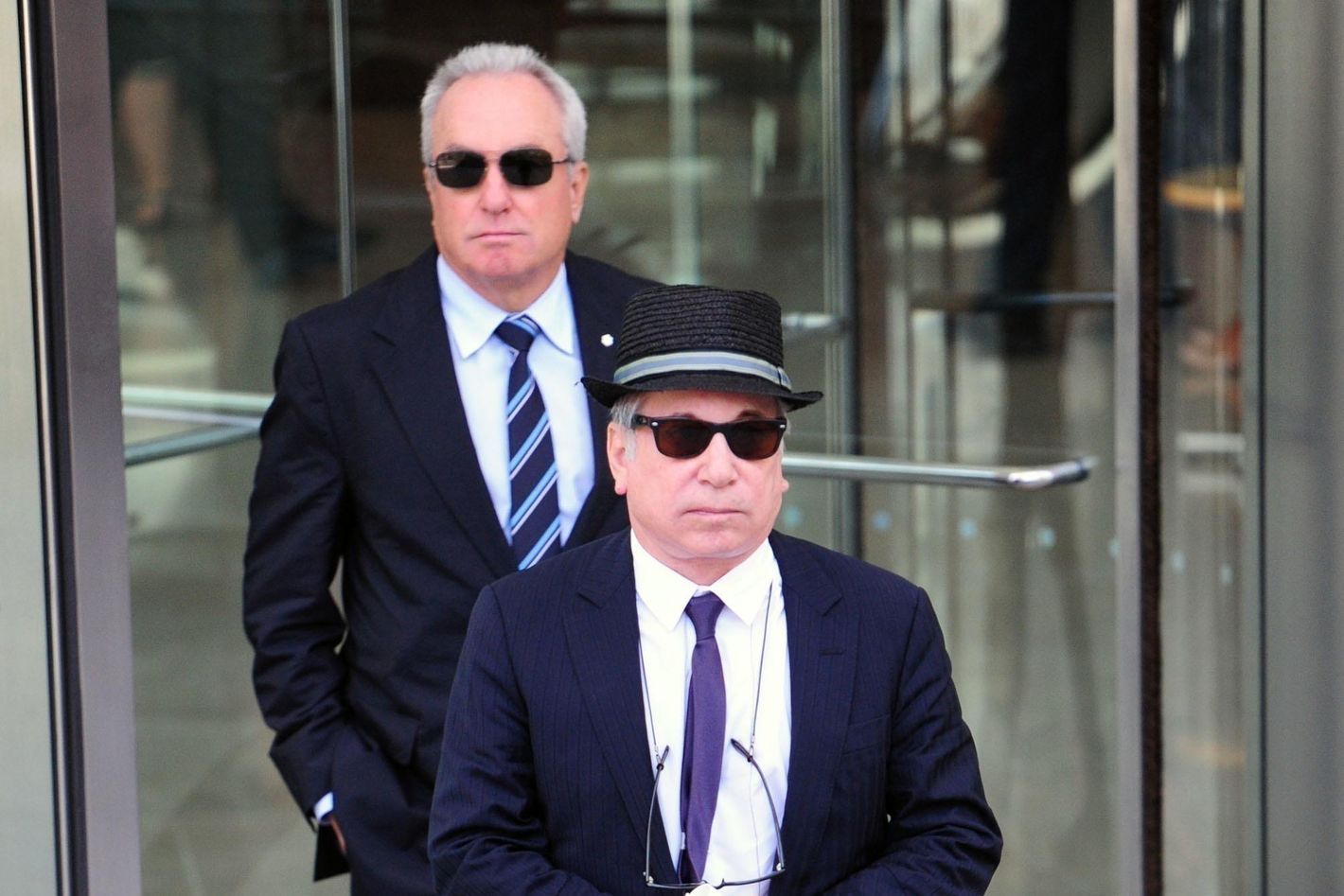
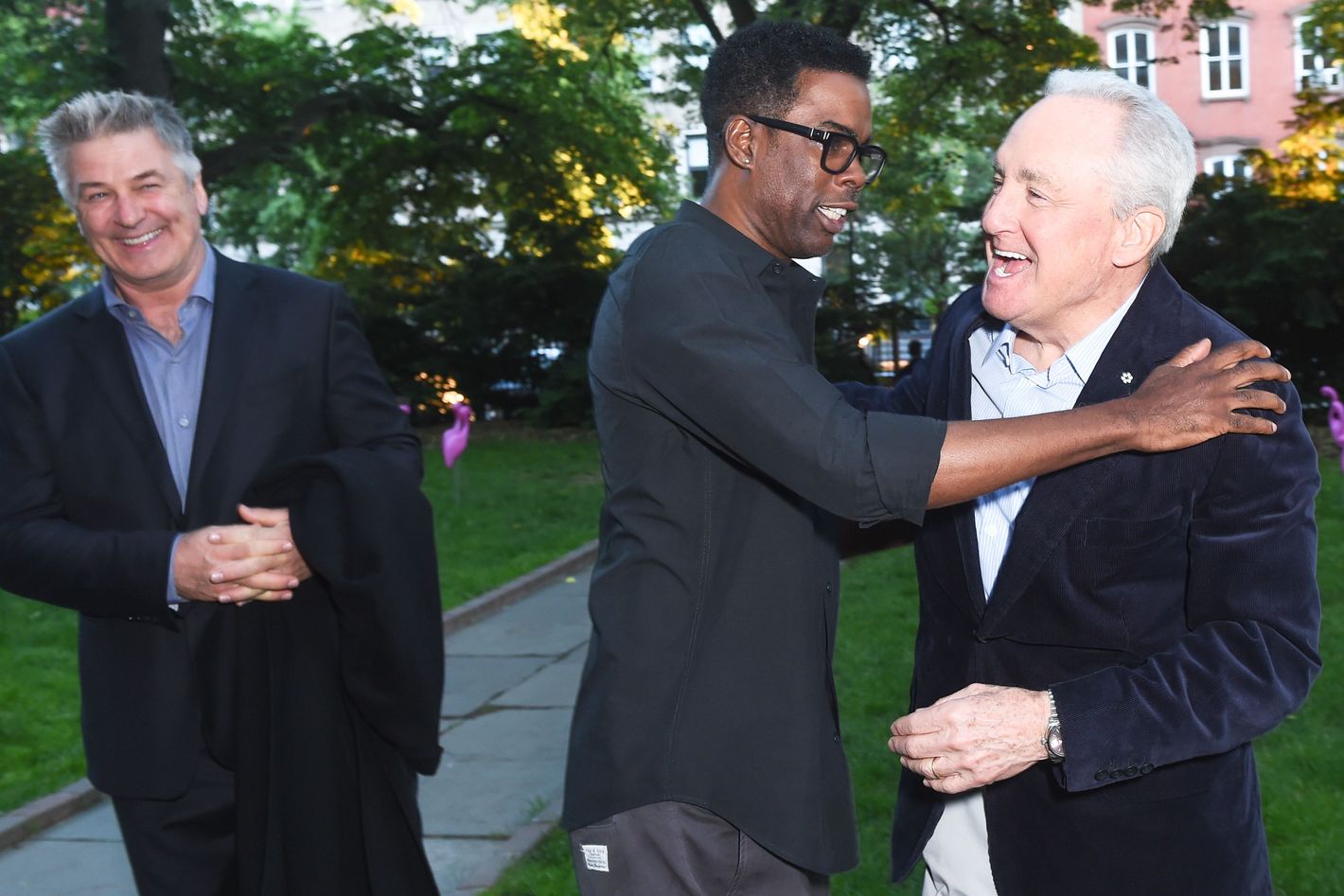
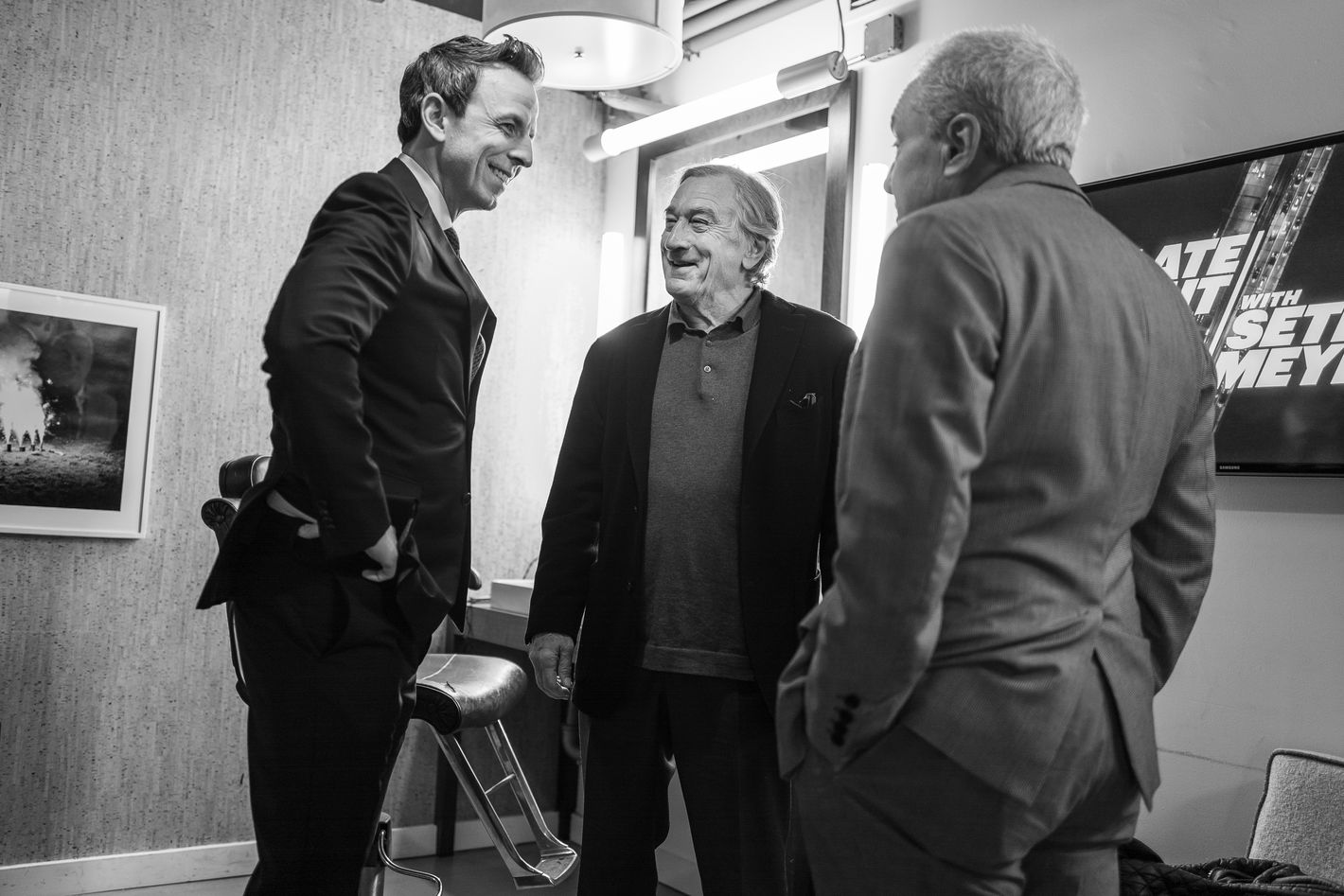
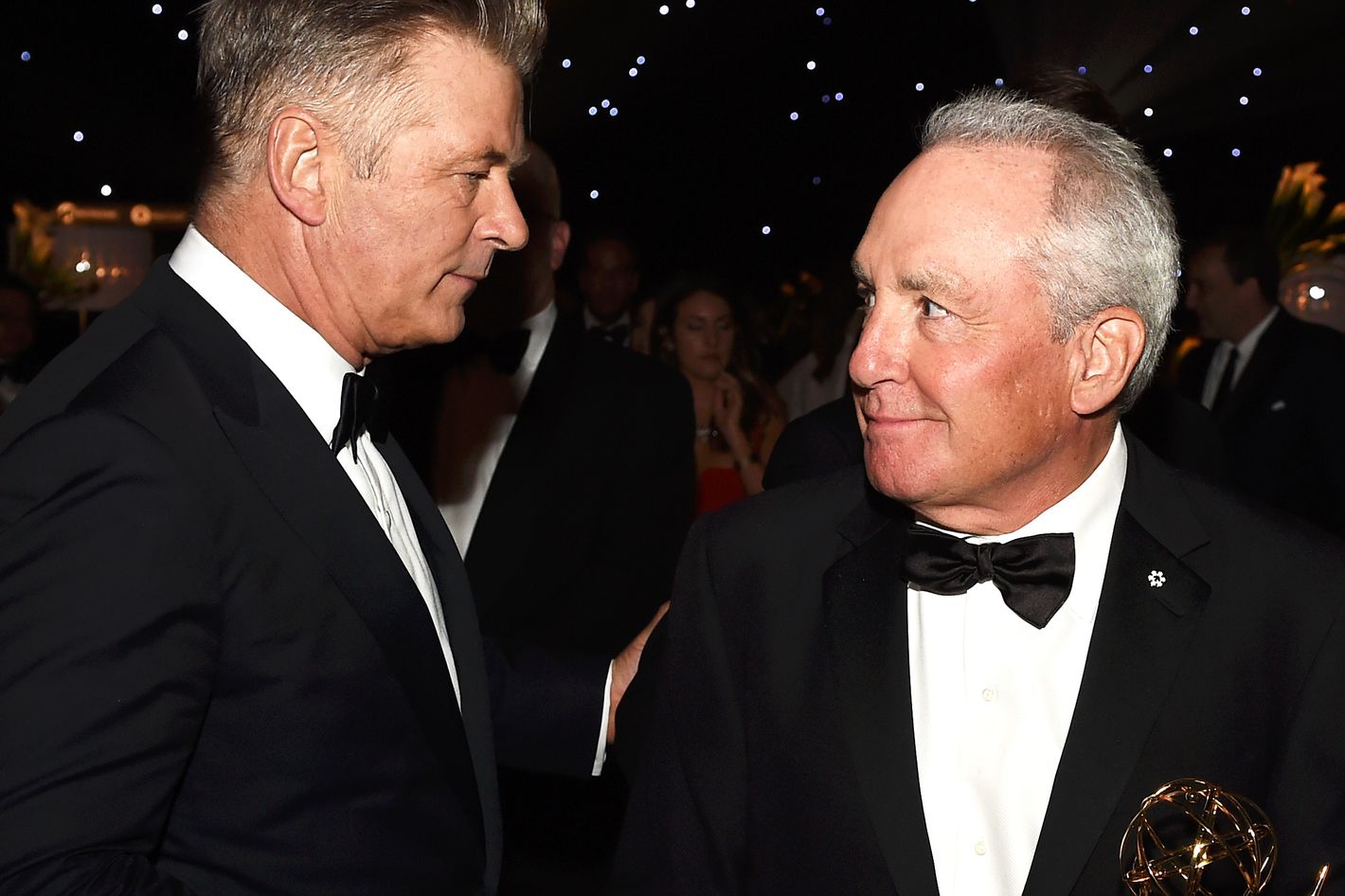
There are many obstacles to understanding Lorne Michaels, and they start with the roadblocks he puts up himself. (Michaels declined to be interviewed for this story.) When I reached out to people who have known and worked with him, many responded with unease. “Alas, I am one of the many who would rather leap out a 17th-floor window of 30 Rock than go on record about L.M.,” one SNL staffer from the 2010s wrote to me, referring to the location of the SNL offices. A recent cast member: “I am not saying a word about Lorne until he is long dead.” A former writer: “I look forward to chatting with you someday about literally anything else.” One big-time Hollywood agent said he would talk to me only with Michaels’s permission, as did an SNL writer who otherwise has a reputation for rebelliousness. A cast member who spent almost a decade on the show called me during a break from shooting a movie, then said that, on second thought, he had better talk to his manager first. (I never heard from him again.) The most common refrain was a simmering concern about the upcoming anniversary show: There are only a few hundred seats in Studio 8H, and people were nervously awaiting their invitations. When I asked a former SNL writer about a mildly unflattering Michaels anecdote she had previously told in a book, she requested that I not repeat it in this article. “I’m hoping to go to the 50th, and I would like a warm reception,” she said.
Others were happy to talk, albeit often anonymously, even when they insisted that they had stopped stressing so much about Michaels and his role in their lives. “I don’t honestly think much about Lorne,” one longtime employee told me toward the beginning of a conversation that eventually lasted three hours. Many people were eager to attach themselves to Michaels at a nostalgic moment or to take another stab at understanding a man who had confounded them for years. “If you actually figure it out,” said Penelope Spheeris, who directed Wayne’s World and Black Sheep for Michaels, “maybe you could let him know.”
When SNL debuted in 1975, Michaels was only 30 years old, but he already had a preternatural cool for his age and relative inexperience. When things grew tense, as they often did in the early days, Michaels made a habit of walking around the SNL offices holding a glass of wine to appear more relaxed. He realized early in his career that his skills weren’t as a performer, but the comics working on the show saw him as an inscrutable presence who seemed to be developing a persona on the fly. A longtime staffer told me that one of the show’s writers used to entertain his colleagues with an impression of Michaels in which he would pretend to be shaving while looking into the bathroom mirror and reminding himself of the evolving quirks of his personality. Does Lorne like hot dogs? A beat. Yes, Lorne does like hot dogs. Michaels got to the office late every day, the idea went, because he had to spend the morning preparing for the role of his lifetime: himself.
Michaels even started to play a version of himself on the show: the straight-man producer managing the chaos. He was a comedy obsessive who loved getting into the nitty-gritty of cracking a sketch, but he also stood a little apart from the clowns and scamps he hired to make the show. After a blockbuster five-season run, Michaels left SNL in 1980, setting up a disastrous interregnum rescued almost single-handedly by Eddie Murphy. Michaels came back in 1985, with his hair starting to gray and wearing a suit. This version of Michaels — the “grandee in a satin smoking jacket,” as Downey put it — has become the show’s most frequently recurring character, appearing in more sketches than the Coneheads, the Cheerleaders, and Stefon combined.
Michaels also realized the usefulness, in show business, of cultivating your own legend. “He’s Canadian Buddha — a little bit cryptic,” Jon Hamm, who has hosted SNL three times, told me. The only person in modern life to produce more impressions is probably Donald Trump. Michaels inspired Mike Myers’s Dr. Evil (“Rrrriiight”) and Baldwin’s 30 Rock character, Jack Donaghy. “Lorne’s got a tuxedo in the glove compartment of his car,” Baldwin once said. Hugh Fink, who wrote for the show in the late ’90s, told me he wants to put on a Broadway show of former SNL cast members doing their best Michaelses. The title: Forlorn.
The persona was its own source of power in part because the role of coolly calculating producer was a natural one for Michaels. In the early days of SNL, Michaels threatened to quit many times when he wasn’t getting his way. But he also knew the value of a compromise. When NBC executives were resistant to Richard Pryor hosting during the show’s first season, Michaels agreed to putting Pryor on a delay in case anything he said ran afoul of NBC’s censors. When Conan O’Brien, an SNL writer who had barely any experience in front of a camera, was struggling in his early run of hosting Late Night in the 1990s, Michaels told him to stay calm — the goal was simply to get to do the next night’s show. “The longer you’re on,” he told O’Brien, “the longer you’re on.”
Michaels was learning this lesson from experience. The 1990s was his most troubled period at SNL. Ratings were down, and the show was losing money. One critic called SNL “a lifeless, humorless corpse,” and NBC executives began considering replacements, including Judd Apatow. Michaels suddenly realized how sad he would be if the show were taken away from him and agreed to meet a number of the company’s demands, nudging Chris Farley and Adam Sandler out and firing Norm Macdonald after Don Ohlmeyer, who was a senior NBC executive at the time, complained about his work on “Weekend Update.” (No one has ever accused network executives of having good taste.) To prove his commitment, Michaels left his newborn son in the hospital to make it to a Wednesday read-through when Sarah Jessica Parker was hosting.
Michaels was ultimately saved by his other great skill: an eye for talent. The end of the 1990s saw the emergence of Will Ferrell and the arrival of Tina Fey and Maya Rudolph, part of a cast that became one of the most beloved in the show’s history. “Lorne’s success with the network is more a tribute to his guile and charm than it is to his being a bulldog,” said Downey, whom Michaels fired along with Macdonald. The goal was to simply outlast whoever the new boss was at the time. (Michaels has worked for 16 different heads of entertainment at NBC.) After Ohlmeyer retired, Michaels hired Downey again and brought Macdonald back to host.
While Michaels was fending off NBC’s attacks, it didn’t hurt his negotiating hand when he suddenly became very rich. An executive at Broadway Video, Michaels’s production company, had the idea to acquire the rights to various classic television properties: Lassie, The Lone Ranger, Rudolph the Red-Nosed Reindeer, Frosty the Snowman. The acquisition was strategic. “Lorne said to me, ‘I left the show once already, and I can’t afford to count on NBC being my bankroll for the rest of my life,’” Steve Shippee, Broadway Video’s CFO at the time, told me. “Our role was to build an asset base completely outside of his producer services so that he had the ability to tell NBC to fuck off.” In 1996, Broadway Video sold the properties for $91 million, roughly half of which went into Michaels’s pocket. “They had no financial leverage over him at that point,” Shippee said.
Michaels’s track record also started to speak for itself: The show had been good enough for long enough that even though Michaels has never officially been an NBC employee, he was part of the network’s fabric. An NBC executive who began working on SNL in the aughts told me that, by that point, it was a fool’s errand to do battle with Michaels. “The regime was new and tried to say, ‘Cut back on cast members or how many episodes,’” the former executive said. “Lorne would always win.” The show’s cast members have long talked about seeing Michaels as a father figure they were trying to please, and over time, even Michaels’s bosses started to seek his approval, rather than the other way around. Kevin Reilly, the president of NBC’s entertainment division from 2004 to 2007, said that a highlight of his tenure came when Michaels, not known for displays of affection, gave him a hug. “Especially having a complicated relationship with my own father — it’s all anybody wants,” Reilly said. “To have Lorne think you’re good.” In 2019, when NBC announced Katie Hockmeyer as the network’s new head of late-night programming, an NBC executive told me they were shocked to hear an HR executive say that “Lorne handpicked Katie” for the role. “Since when does a producer handpick the person they’re reporting to?” the executive said.
SNL is an incredibly expensive show to produce and always has been. “Can you make it for less? It would be hard to make it for more!” a former NBC executive told me. The act of doing a new live show every week with custom sets and costumes eight floors up in a Manhattan skyscraper with tiny elevators adds up. Ken Aymong was asked at various points to sketch out how much money NBC would save if SNL were made on a more production-friendly stage, and the number was so large that he could only estimate it as “a lot.” In addition to the 17-member cast, more than 300 people appear in the credits of each episode; by comparison, Late Night With Seth Meyers employs roughly 60 people. SNL costs more than $4 million an episode and north of $100 million a year — more than The Tonight Show, which airs four new episodes every week. And it is Michaels who safeguards the show’s funding.
Michaels doesn’t always get what he wants. In 2019, he hired Shane Gillis, the sort of red-state comedian that Michaels has always wanted to have on the show. Before the season started, old jokes Gillis made on a podcast using slurs about Asians went viral. Within days, NBC executives, under pressure from an Asian American advocacy group, demanded that Michaels fire Gillis; one NBC executive from the time told me that “Lorne was railroaded into it.” Michaels could have fought for Gillis, but he had learned over the years that survival meant sometimes letting things go. Michaels stayed in touch with Gillis, and once the fervor died, he brought him back to host. Last year, he even asked him if he might play Trump.
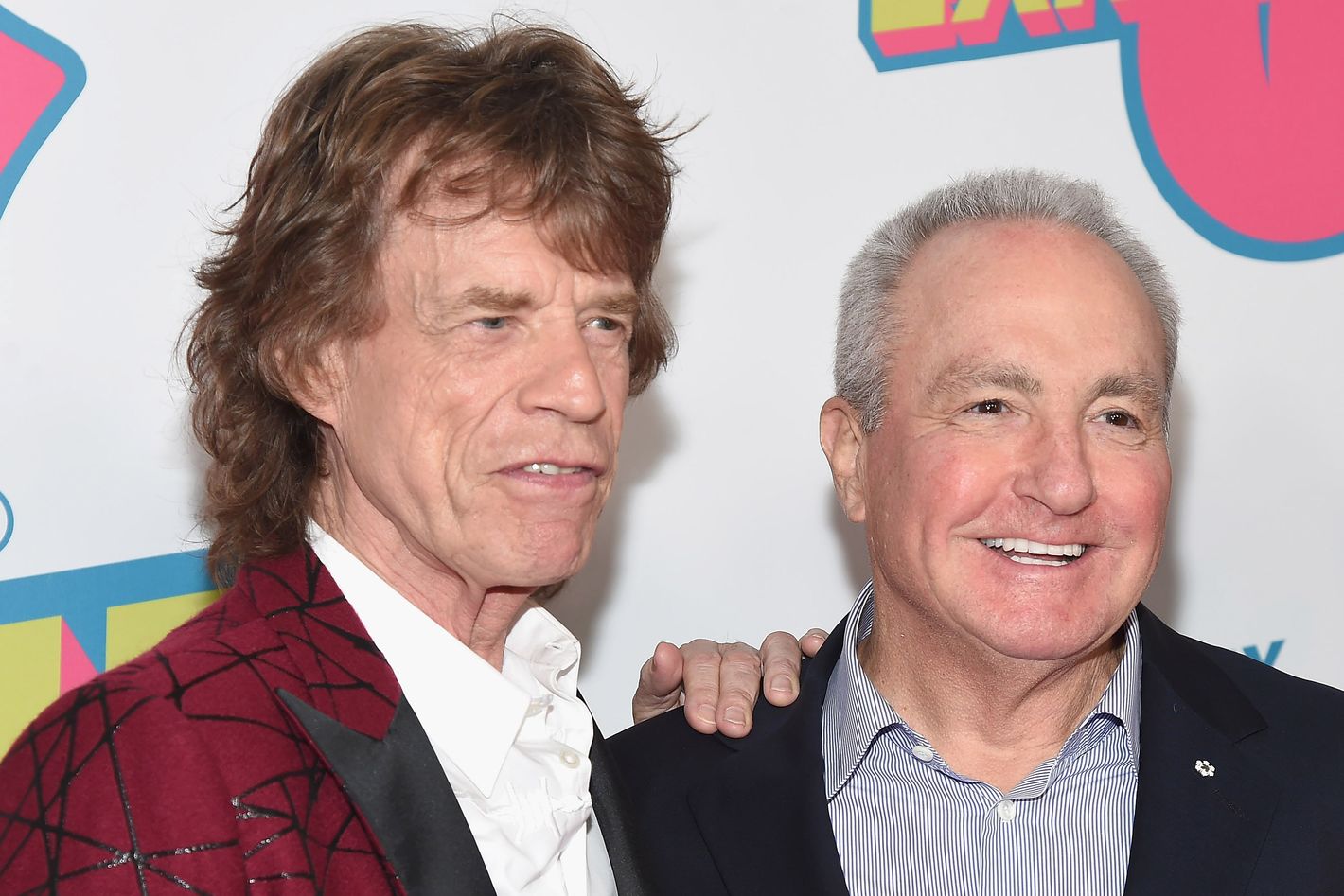
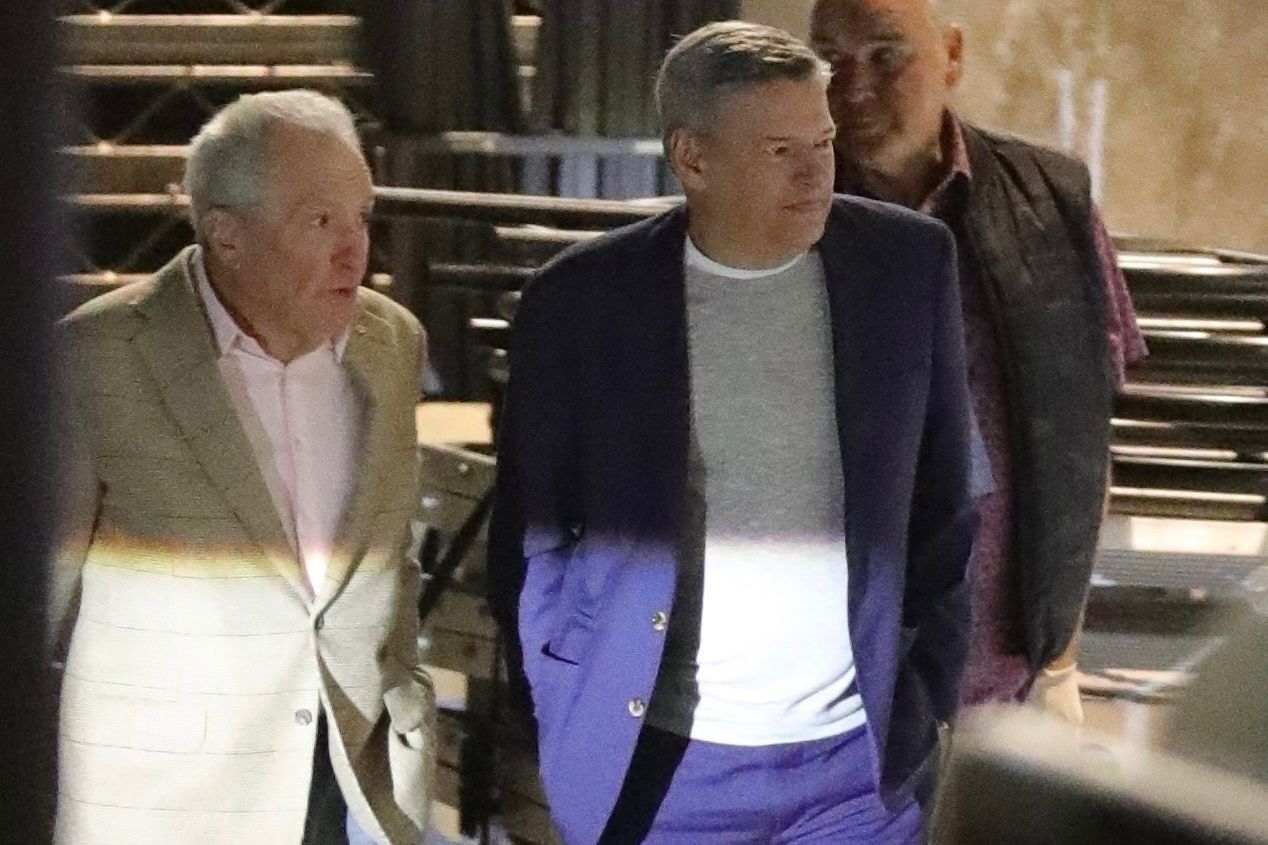
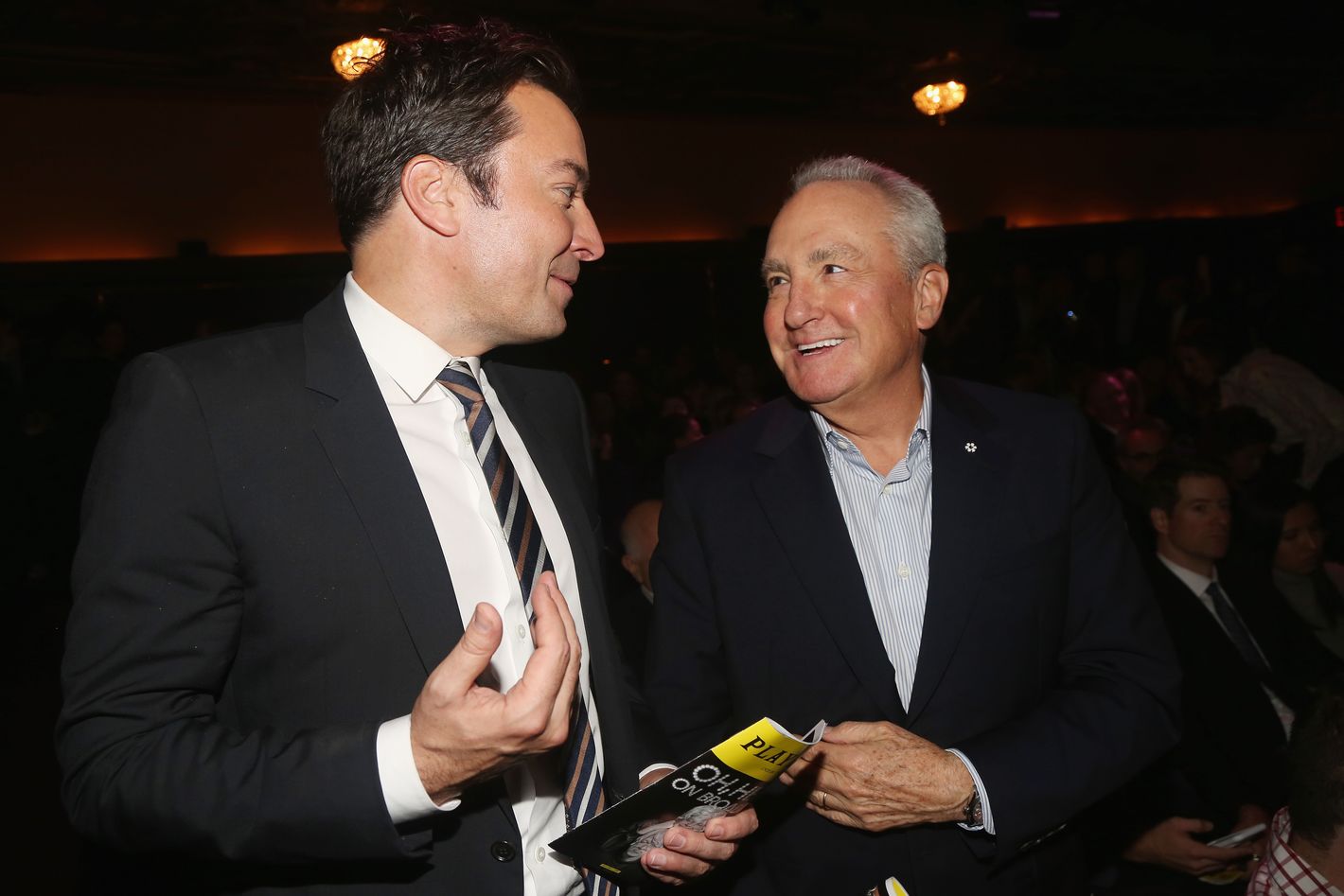
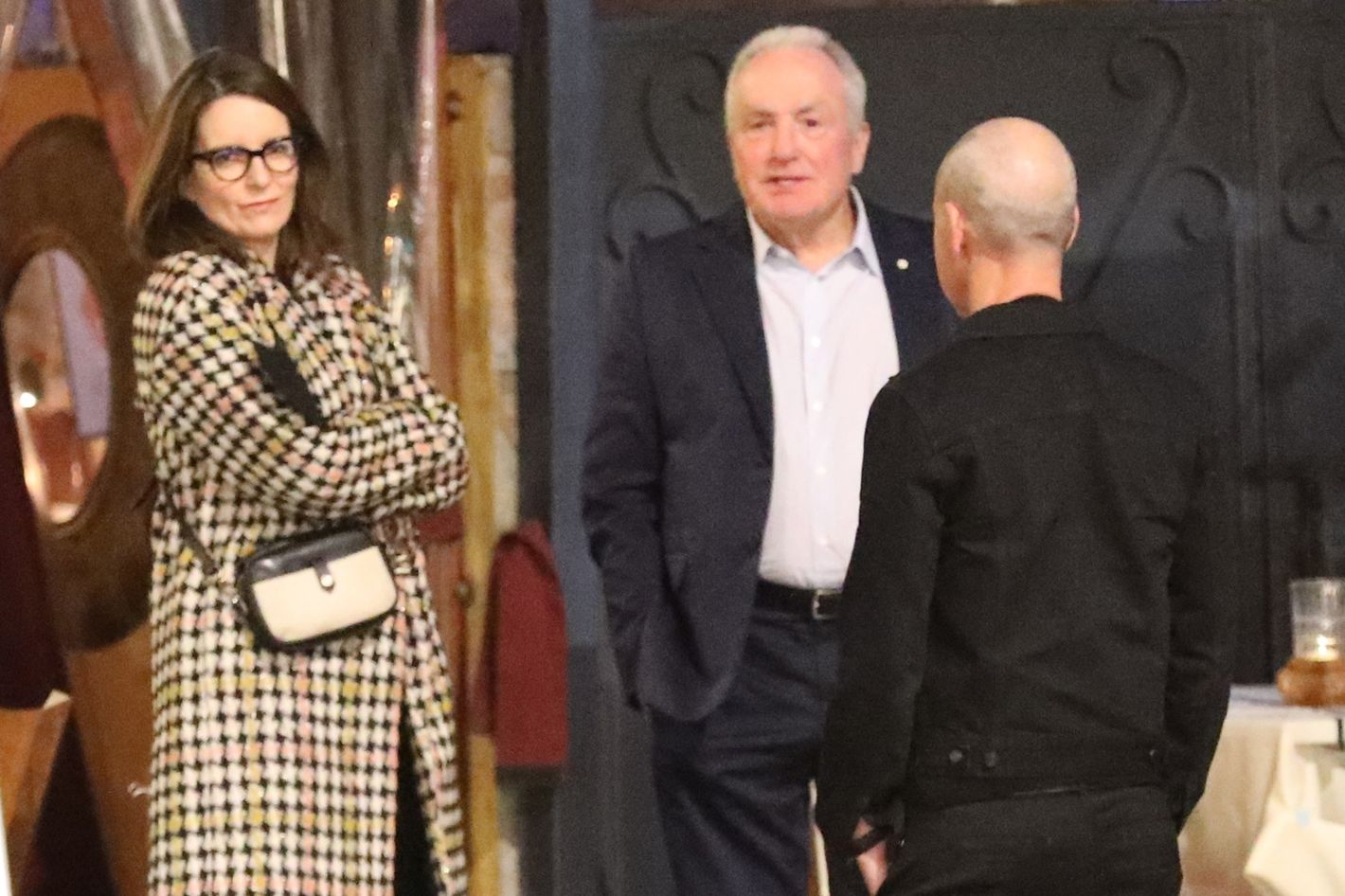
After the success of SNL’s first season, Michaels bought a loft downtown and made the mistake of letting John Belushi crash there one night. Belushi fell asleep with a cigarette in his mouth, the place caught on fire, and Michaels never lived below 59th Street again. By season five, NBC was paying him seven figures, according to Saturday Night: A Backstage History of Saturday Night Live, a juicy history of the show’s first decade by Doug Hill and Jeff Weingrad. Michaels had the house in the Hamptons and an apartment on Central Park West right next to Paul Simon, whom he met just before SNL went on the air and who would become his closest friend. A door in Michaels’s kitchen opened into Simon’s laundry room.
Michaels quickly started running in glitzy circles; in the 1990s, when one of Michaels’s assistants expressed awe that he was going backstage at a Rolling Stones concert, Michaels replied, “I have a backstage pass to life.” Mike Myers remembers arriving at Michaels’s Hamptons home and being shown to “Mick’s room,” while Dana Carvey was given “Jack’s room,” as in Nicholson. Whenever Michaels mentioned something “Paul” had done, no one knew whether he was talking about Simon or McCartney. Michaels is so infamous for blithely dropping the first names of his famous friends into conversation that when he mentioned Cher during a lunch with Steve Martin and Kevin Nealon, Martin stepped in to quip, “Cher who?”
Over the course of 50 years, Michaels has structured SNL in a way that suits his quirks. To start, he rarely gets to the office before 5 p.m. Michaels has been a night owl ever since the ’70s, when he blanched at the idea of a breakfast meeting with an NBC executive that led to SNL because it was too early in the morning. In the 1990s, Andrea Fisher, a private chef who worked for Michaels and his family, said the only meal she had to make for Michaels himself was breakfast, served every day at noon in his bedroom: a crumpet with jam, fresh mango, and a French press. One of Michaels’s assistants told me he “doesn’t like to stay at a hotel that cuts off breakfast.”
Michaels has three assistants, known somewhat derisively as the Lornettes because they have almost always been young, female, attractive, hardworking, and resolutely obstructionist when it comes to getting time with their boss. They occupy a row of desks outside his office in order of seniority. “When you’re an agent’s assistant, you’re always asking for something, but when you’re Lorne’s assistant, people always want something from you,” a person who has done both jobs told me. Whenever Michaels is on his way to 30 Rock, one of the Lornettes turns on a popcorn machine; he has been addicted to the snack since he picked up the habit years ago as a way to quit smoking. (Anne Beatts, a writer on the show, said she and Tina Fey had once bonded over the fact that “the smell of popcorn actually triggers an anxiety mechanism in me.”) Dinner has always been important to Michaels — he takes the host out every Tuesday to an Italian restaurant near 30 Rock — and specifically dinner out on the town. When I told a former Lornette that I had recently spoken to a powerful person in Hollywood who ate dinner with Michaels a few times a year, she told me, “There’s a list of a hundred people that could be.”
The fact that Michaels is comfortable in the world of the rich and powerful has given him a certain expertise in managing and wrangling big personalities. Three different NBC executives I spoke to all had stories about how Michaels had shepherded Alec Baldwin through seven years of 30 Rock. Kevin Reilly said that a day after 30 Rock won Best Comedy at the Emmys, Baldwin’s agent called to say he wouldn’t be returning to the show. “I call Lorne in a panic, and Lorne says, ‘He’ll realize in retrospect that this is a very good time in his life. He’ll be there,’” Reilly said. “Lorne didn’t hit the panic button.” Ben Silverman, who replaced Reilly, told me, “There were myriad moments where Alec would threaten not to show up, Alec would demand a pay raise, Alec would demand a weird schedule,” and Michaels was always there to smooth things over. “He just spoke Alec,” Silverman said.
Around this time, Michaels had surveyed the shifting entertainment landscape and had a prescient realization. “The network isn’t that powerful anymore,” he said in 2006. “Talent is.” Michaels has always had to fight to keep SNL’s stars from abandoning the show for more lucrative Hollywood gigs, which has led him to give considerable leeway to people he wants to keep around. In 2022, after the midterm elections, Michaels invited Dave Chappelle to host at a moment when Chappelle’s jokes about trans people had made him a lightning rod. A non-binary member of the writing staff told producers that they preferred to sit the week out. Michaels didn’t have a problem with it, but “Page Six” blew up the story when it reported incorrectly that multiple writers were boycotting. During dress rehearsal, Chappelle told a joke about the situation. “The papers got it wrong,” Chappelle said, according to SNL staffers who watched the performance. “Only one person has a problem, but the paper got confused because that person is a they.”
Michaels didn’t object to the joke per se, but he and other producers immediately started fielding angry texts from the cast and writers who felt betrayed after working hard all week to put on the show with Chappelle. After rehearsal, Michaels warned Chappelle against telling the joke on air. “You’ll lose the staff,” he said. The point was less that the joke was unfair — or lame — and more that telling it would not be in service of putting on a good show. The comment was also in keeping with Michaels’s style of avoiding direct orders and instead letting the talent come around to the result he wants on their own. (A common refrain: “I know you don’t want to do that sketch — and when you do it, you’ll be fine.”) Chappelle left the joke out of the broadcast.
Some staffers weren’t sure Michaels would have Chappelle back after the incident. But Michaels reveres the comedian, forgave his transgression, and persuaded him to return to host the first show of 2025. “This goes back 50 years to Richard Pryor,” said Ted Sarandos, the Netflix co-CEO who has given Chappelle multiple stand-up specials. “I think what Lorne saw then is what he sees now in Dave, and me too. Whoever is the best at this craft in our time, full of complexity, full of challenges, full of finding lines and crossing them — it requires a power broker to protect that.” Chappelle chose to appear in fewer sketches than most hosts do, and his monologue went on for 16 minutes and 49 seconds — the longest in SNL history. (Chappelle holds the second and third spots, too.) But the only visible conflict in the studio came when Chappelle started the monologue by talking about how hard Michaels had begged him to come back. Michaels bristled at that — and then later announced that Chappelle would appear again at the 50th-anniversary show.
There’s a way in which Michaels’s management of talent can make him seem like the Mafia don of comedy. If you’re in the family, you’re taken care of. A former cast member told me that, in 2017, Pete Davidson told new cast member Chris Redd not to worry about a deal he had signed for another show that might conflict with his SNL duties. “I’m pretty sure Lorne is undefeated in contract disputes,” Davidson said. Michaels prefers to keep his hands clean, depending on consiglieri to deliver bad news or to ax cast members he isn’t bringing back. One former cast member told me Michaels sent him a nice bottle of whiskey on his birthday, with a personalized note, only to fire him through a deputy shortly thereafter. “You cannot say ‘no’ to Lorne Michaels,” said Spheeris, the Wayne’s World director. “If you do, your head is slashed off — to the guillotines.” After Spheeris declined Michaels’s request to direct a movie adaptation of Tim Meadows’s SNL character the Ladies Man, Spheeris says Michaels “never spoke to me” again.
A clear hierarchy has always existed at SNL. Last fall, during a series of photo shoots for this magazine with cast members from all 50 years of SNL, Seth Meyers surveyed the assembled group during one shoot — which included Jimmy Fallon, Tina Fey, Kenan Thompson, and Steve Martin — and exclaimed, “Lorne’s ten favorites!” Another shoot later on included a different group: Rachel Dratch, Chris Kattan, Joe Piscopo. When Tim Meadows walked in, unaware of Meyers’s earlier comment, he said, “What is this — Lorne’s least favorites?”
Michaels has long had a reputation for breeding a brutally competitive environment at the show. “It was my first big job, and Lorne scared the fuck out of me,” said David Mandel, an SNL writer who would go on to work at Seinfeld and serve as the showrunner for Veep. “I overscrutinized every interaction. At one point, he said something like, ‘Are you having a good time?’ I thought, Do you think I’m having too good a time? ” Michaels is infamously tight with praise, and prone to playing mind games, which has fostered accusations that he is running a comedy cult. Kenan Thompson, who is SNL’s longest-serving cast member ever, said that he finally got comfortable around Michaels in his 17th year on the show. “The atmosphere was sadomasochistic,” R. D. Rosen, who lasted only a few months as a writer in the 1980s, told me. He recalled one of Michaels’s deputies reacting to a sketch idea he had by asking for his hand and slapping it. Part of Rosen’s decompression process was publishing a mystery novel a few years later called Saturday Night Dead. In the story, the enigmatic and powerful showrunner of a sketch-comedy show is mysteriously defenestrated from his midtown office during the after-party. (Spoiler: One of the writers did it.)
SNL staffers I spoke to from recent seasons said the environment seems to have loosened up. David Spade recalled a cold open in the fall in which he had played Hunter Biden while current cast member Sarah Sherman played Matt Gaetz. When Michaels gave her a stage direction, Spade was shocked to hear Sherman respond, “I’ll try.” “I’m like, How about ‘Yes, sir!’?” Spade said.
But SNL remains a place where people never quite know where they stand, even after they’ve gone. While talking to people in the SNL diaspora and the parts of the comedy world that obsess over the show’s inner workings, I heard several rumors about why cast member Chloe Troast wasn’t asked back to the show this season. Some of the theories were simple enough (the writers couldn’t figure out how to use her), while others fit the perception of Michaels as a fickle tyrant: Troast had invited a friend to the show’s after-party who sidled up to Michaels’s table and stole a piece of food off his plate; she had been asked to lose weight after the season was over; or Michaels simply felt the staff had grown complacent, and he had wanted to shake things up. When I mentioned all these rumors to another SNL-er, she cautioned against believing anything when it came to sussing out Michaels’s decisions. “Maybe all of that is true, but here’s the thing: We’ll never know because he’ll never say,” she said. “And she’ll always wonder.”
Decades into handling some of the biggest stars in the world, he carries a certain swagger. In 2015, SNL reached out to Taylor Swift to ask if she would make a cameo in a video sketch spoofing Swift’s girl squad that suggested it was actually an apocalyptic cult. Michaels was in his office when Swift called him directly to say that not only would she not appear in the video but she wanted Michaels to kill the sketch entirely. Michaels heard Swift out, but as he did he picked up a piece of popcorn from the basket on his desk. “Taylor, I do not negotiate with terrorists,” Michaels said before tossing the kernel into the air and catching it with his mouth. The video aired, and on Monday, Michaels found flowers at his office with a note from Swift: “I hope there’s no bad blood.”
In 2002, when Michaels was approaching 60, he sat for a portrait with the painter Eric Fischl. As The New Yorker’s Susan Morrison recounts in a poignant moment in her new 600-page biography of Michaels, Fischl took dozens of photographs of Michaels while he happily regaled the painter with his Old Hollywood tales. But when Fischl developed the photos, they took him by surprise. He saw “a kind of world-weariness” in the high-flying power broker. “His body language was such that when he finally sort of fell into himself in the chair, you could see what the weight had done,” Fischl said. When Michaels came back to view the finished portrait, he stared at the painting in silence for a while before asking Fischl, “How did you know?”
Michaels has admitted that making SNL can be draining — that when he spends four hours reading the stage directions on 40 potential sketches at every Wednesday read-through, there are moments when it “feels like life is slipping away from me.” But he also has remarkable stamina for an 80-year-old; even today, he holds court at the SNL after-party until three or four in the morning. “He has never, even for five minutes that I have known or observed, been on autopilot,” Richard Plepler, the former head of HBO who has known Michaels since the ’90s, told me. “I used to have dinner with him at seven or 7:30 and then say, ‘Okay, Lorne, I’m going home.’ And he’d be going back to the office.” Michaels has long been a bit of a health nut; he and Paul Simon have shared a trainer for years, and Michaels has never missed a single SNL episode in Studio 8H. “I sensed that he was aging a bit — that he wasn’t as quick and sharp — but not by much,” Don Roy King, who served as SNL’s director for 15 seasons before retiring in 2021 at the age of 73, told me. “The fact was I was slipping faster than he was. Eighty years old is old! I know because it’s here for me.” Others who know Michaels have detected a subtle decline but nothing unusual for a newly minted octogenarian. “With Lorne, you always feel like there’s an NBC page hanging upside down in the closet with his blood slowly draining into him,” a person who has known Michaels for years said.
On today’s SNL, Michaels’s role during the first half of each week is now largely ceremonial. He used to come back to 30 Rock after his Tuesday dinner with the host, a little tipsy, and pop in on writers to see what they were working on or take appointments with anyone looking for help executing an idea. But the current writing staff doesn’t check in as much with the boss — even if he wishes they did. “That’s too bad, because it was fun to come in and run the beats of a sketch down with him,” Al Franken, one of the show’s original writers, told me. “There’s an age difference now between him and the writers that wasn’t there when I was doing it.” It’s primarily on Saturday that Generalissimo Michaels still emerges, offering sometimes biting critiques during dress rehearsal to writers, who then have to scramble to fix their sketch before the live show. Every writer I spoke to admitted that his notes are still usually spot-on.
A studio executive who has worked with Michaels recalled a dinner with him 15 or so years ago during which Michaels said, “I don’t even know what’s funny anymore.” The point of saying this wasn’t to emphasize his comic obsolescence but to point out that he knows the only way to keep SNL relevant is to trust the instincts of the younger writers and actors, even when he didn’t quite get the jokes and references that they were making. Even SNL’s critics admitted that, while he’s obviously not on TikTok, he still has an eye for the new or unusual — for hiring a Sarah Sherman or a Bowen Yang. A misconception about the comedy that appears on SNL is that it reflects Michaels’s taste. In reality, it reflects his assessment of how the audience responds at dress rehearsal, after which he chooses the sketches to make it to air. “He and Trump kind of have this superhuman sense for reactions,” a staffer who worked on the show during the first Trump administration said. “They listen to the audience.”
Still, it is impossible to ignore the fact of Michaels’s age, especially when the subject of succession comes up. For years, he has greeted the question with a joke. There would come a time, the bit goes, when it would become obvious to Michaels and everyone around him that he had lost a step and should no longer be running a show as important and complicated as SNL — at which point he would stick around for another three years.
By 2020, Michaels seemed to have put an actual timeline on his departure. He had signed a contract through the 50th anniversary and said on the Today show that the 50th season would be his last. “By that point, I think I really deserve to wander off,” he said. He told friends the same thing, and SNL-watchers took note of internal reorganizations and decisions that suggested Michaels was looking toward a future without him. Last year, Michaels approached the Harry Ransom Center at the University of Texas at Austin about hosting his archive and said on the Emmys red carpet that the question of his succession would be settled before the 50th-anniversary show came around.
But something changed along the way. Today his refrain is simply “Talk to me after the 50th.” The flip-flopping — what one Michaels associate called “his weird, cokeheadish retirement back-and-forth” — has confused everyone around him. “All the waffling is a little bit Iger-y,” an entertainment executive who knows Michaels said, referring to Bob Iger’s tortured return to Disney. Several people floated the possibility that Michaels might stay too long — that inevitably, a decline would come, a mistake would be made, and the chance to go out on top would be gone.
Nevertheless, the consensus among people at SNL, within NBC, and around Hollywood is that Michaels isn’t going anywhere. “My bet? He’ll just stay,” a longtime Michaels associate told me. “I fear with Lorne that he’s so inextricably linked to the show, and his life is so inextricably linked to the show, that he can’t imagine it without him.” At the very least, the decision is entirely up to him. No one at the network is in a rush to push Michaels out, partly because it isn’t clear who could fill his shoes. As Michaels likes to say, “There are no heirs apparent in show business.”
While no one questions that Michaels is in control of his fate, SNL is, technically speaking, no longer his show. For much of SNL’s run, Michaels has owned a roughly 50 percent stake in everything, from the show’s merchandise to syndication. (SNL’s format has been licensed for localized versions in Italy, Russia, Japan, and many other countries.) But around SNL’s 40th anniversary, in 2015, NBC decided that it wanted to buy Michaels out and paid him more than $200 million for his stake in SNL, according to multiple people with knowledge of the transaction. “Based on the numbers that accountants look at alone, they couldn’t necessarily justify it,” one former NBC executive said. “But you can bake in the fact that this thing is gonna be around for years — oh, and happy Lorne, happy life.” The sale suddenly put the issue of succession squarely in Comcast’s sights. “It’s impolite to do so, but succession was being discussed back at the 40th,” the executive said.
The leading contenders to replace Michaels are generally considered to be Tina Fey and Seth Meyers. “Seth and Tina would come in knowing what they would do differently. They’ve been thinking about it for years,” a recently departed NBC executive told me. The presumption is that the job is Fey’s if she wants it. She lives in New York, spent years handling Baldwin on 30 Rock, and has a clear love for the show, having come back to host or cameo almost every season since she left in 2006. In 2023, the New York Post blindly reported that Fey had been approached about the job, but the chatter in Hollywood circles is that so far, at least, she hasn’t taken the bait.
Meyers, meanwhile, spent 13 years at SNL, which makes him the third-longest-tenured cast member in the show’s history, after Kenan Thompson and Darrell Hammond. Meyers’s affection for SNL is deeper and more public than pretty much anyone else’s, and a person who has worked with him said he seems unlikely to turn down an offer if it comes. While NBC renewed his late-night contract last year through 2028, his show has suffered budget cuts (including the axing of his in-house band), and the future of late-night programming overall is in doubt. Last year, NBC trimmed Fallon’s Tonight Show to four nights a week, and CBS canceled James Corden’s late-night show entirely.
Thinking up other candidates has become a parlor game in the comedy world. If Michaels wanted to stay in-house, there’s Colin Jost, who is 42, spent a decade as a writer on the show before joining the cast to co-host “Weekend Update,” and is no stranger to dealing with celebrity. (He is married to Scarlett Johansson.) Judd Apatow’s name comes up, but he’s almost 60. If not Tina Fey, then maybe Amy Poehler? Michaels has a few deputies on the writing and producing staff who know how the show works. “Don’t think that somewhere in Lorne’s mind, he won’t have harbored the idea that this is a family business,” one former NBC executive told me. “In a world where Theo Spielberg worked at the show” — along with the children of Calvin Klein, Al Gore, Regis Philbin, and Woody Allen, whose daughter Manzie is now on the writing staff — “it would be foolish not to think the next head of Broadway Video, and perhaps of SNL, might have the last name Michaels.” Henry, his eldest son, was a writer on a show Michaels produced; his middle son, Eddie, now works at Broadway Video; and his daughter, Sophie, joined SNL last year in the talent department.
The more pressing question may be whether anyone who is capable of the job would want it. Running SNL is a weekly grind, and the role might feel limiting to some of the performers who are supposedly in contention. A former SNL-er put it this way: “Do I think that Tina Fey, who is rich and successful and gets to make her own shows, wants to run that shitshow? I do not.” Whoever comes in next will be working in the shadow of Michaels’s legacy while operating without the decades of fortification Michaels has built up within NBC. After Michaels left the show in 1980, NBC cut SNL’s budget, and everyone around the show assumes the same thing will happen whenever he leaves again. “This whole regime does a lot of belt-tightening, and I can’t imagine that it doesn’t make them absolutely insane to see the budgets at SNL,” one former NBC executive said. A few SNL-ers suggested that perhaps the show should simply come to an end whenever its creator and impresario steps down.
When I asked Downey, the longtime SNL writer, what he would look for in Michaels’s replacement, he thought for a second and then offered a caricature: “I could imagine a person around 30, with lots of energy, who has a knowledge and appreciation of comedy, who defends writers, and who respects actors but doesn’t want to be one.” I pointed out that he had just described Lorne Michaels 50 years ago.
It’s very apocalyptic here,” Ted Sarandos, the Netflix CEO, said when I reached him in early January. The fires in Los Angeles were just starting to rage, and the air quality was so bad that Sarandos had been forced to cancel a walk that afternoon with Michaels, who was on a holiday break from SNL. Michaels is a big walker, and the two try to get out whenever Michaels is in town. “The first time we did it, we walked for three hours around Beverly Hills, just in circles, and I said, ‘Do you always walk this long?’” Sarandos told me. Seth Meyers recently told a story about spending a summer in the aughts taking so many long walks with Michaels while making a movie that Meyers, who is 30 years younger than Michaels, had to go see a doctor for knee pain.
Sarandos is the only person in the past 50 years who has come close to challenging Michaels’s crown as comedy’s most powerful man, thanks to the howitzer of cash Netflix has sprayed around the comedy world in recent years. Sarandos is a self-described comedy nerd and has long considered Michaels a mentor; he goes to the show three or four times a year, mostly for fun, and Michaels gave him a seat for the 50th anniversary. “He is, to me, a bridge to the beginning of it all — a real living embodiment of the history of television,” Sarandos said of Michaels.
In certain respects, maintaining that connection is what’s at stake when considering the future of SNL with or without Michaels. The show’s influence has always extended well beyond its time slot, and the lineage of TV comedy that stems from SNL is a syllabus of the genre: It’s Garry Shandling’s Show, King of the Hill, Parks and Recreation, Portlandia, and many more were all created in part by SNL alums, while every writers’ room from Seinfeld to The Simpsons was filled with staffers who came from SNL. “Where did I learn how to be a showrunner? In some ways, it goes all the way back to SNL,” said Mandel, the Veep showrunner. “You are the mini-producer of your sketch; you are giving the actors notes, and giving the director camera blocking, and talking to wardrobe and set design.” Tina Fey devoted an entire chapter of her book, Bossypants, to “Things I Learned From Lorne Michaels.”
A minority view I heard: Good riddance. Some in the comedy world have long felt that SNL had too much power and that the show was a comedy Death Star tractor-beaming every funny person in America into the Lorne Michaels way of making comedy. “Big picture, I think SNL has made comedy worse,” one prominent comedy showrunner said. “Certainly there has been legendary comedy on SNL, but would that talent have not found full-flowering in other systems? The idea that if not for Lorne, there would be no Will Ferrell — I don’t agree with that at all.” The showrunner argued that “comedy and institution should not be in the same sentence” and that “the natural order is for the new to replace the old — not just people but in terms of ideas. At a certain point, you’re chasing a handful of glory years and golden moments.”
Streaming and the internet have certainly made it easier than ever to find new and offbeat comedy, and in conversations about SNL alternatives, many people invoked I Think You Should Leave, the cult Netflix sketch-comedy hit created by SNL alums Tim Robinson and Zach Kanin. Robinson spent a year as a performer on SNL before stepping back from the cast to work as a writer. “It was always a puzzle for Lorne — he knew Tim was a genius; he just didn’t know how to fit him in that show,” Sarandos told me. Robinson and Kanin initially brought the idea for the show to Broadway Video, but Michaels’s company passed. Some of the sketches that ended up on the show started out as SNL scripts that were too weird to make it to air, and to many, the show stands out as the kind of gonzo comedy that can flourish when an 80-year-old isn’t at the helm.
But it was just as easy to see I Think You Should Leave as yet another extension of Michaels’s influence. Andy Samberg, Akiva Schaffer, and Jorma Taccone — the Lonely Island trio behind “Lazy Sunday” and “Dick in a Box” — executive-produced the show, and Schaffer directed the first season. Almost all of the episodes were written by SNL alums, and half a dozen cast members have appeared on the show. What could be lost in a post-Michaels, post-SNL world, its defenders told me, are the precision and professionalism that come from an SNL education. “I think it’s important to have a university that just weathers the storm of changing passion,” Downey said. “I don’t think you get I Think You Should Leave without SNL. I’m not even sure you get The Simpsons.”
Michaels is unapologetic about being “the last person standing who thinks network TV is important,” as he has put it, and has a particular sense of what that means. One of his refrains to his staff over the years has been that they are making a show for the entire country. He believes holding on to the show’s mass appeal has been more important to its survival than staying on the bleeding edge of comedy. When John Mulaney and Simon Rich wrote a sketch that involved two parents explaining to their children that Noodles, the family dog, had died of autoerotic asphyxiation, Michaels said, “I hope you’re proud of yourselves; that just went out to all 50 states.”
Beyond NBC, the value proposition of SNL has always been Michaels’s ability to identify, train, and rocket comedians into the broader Hollywood universe. The show isn’t minting stars in the way it did as recently as the aughts — but no one else is either. The argument many comedy people seemed to be making to SNL naysayers is Be careful what you wish for. One entertainment executive voiced a fear that we are heading toward a world in which the dominant comedians would be “anyone whose last name is Paul” — Jake, Logan — at the expense of the Feys or Rudolphs or Mulaneys. “If you believe Joe Rogan,” the executive said, “then Studio 8H is now in Austin.”
It’s easy to imagine Michaels, the standard-bearer for an elevated middlebrow comedy that speaks to all 50 states, cringing at the thought. He has long said that he wants to see SNL live on without him, and even if Michaels has not settled on his future, he would likely see the humor in how some of the funny people he has hired think his tenure on the show might one day end. I heard several different renditions of the same darkly comic premonition, as if his many protégés were all workshopping the same premise for a sketch about their inscrutable boss. “I have this vision of him — it’s Saturday night, end of a season,” one of them said. “He tells whoever, ‘I’ll be at the party soon,’ and then he sits down in his office and closes his door. Everybody goes off to the party and then, like a robot, he just realizes his battery is dead. On Monday, when they find him, it’s completely rigor mortis Lorne.” The kicker: “And for the first five or six minutes after the discovery, they don’t even realize he’s dead.”

Latest News
For Sale! 2016 Sea Ray 350 Sundancer – $180,000
Reel Deal Yacht is pleased to feature a meticulously maintained 2016 Sea...
Koh Lanta: Thailand’s Best-Kept Secret
Discovering Koh Lanta: Thailand’s Hidden Gem Koh Lanta, a small island nestled...
Chinese Couple Opts for Bicycles Instead of Limousines for Their Wedding, Earning Community Blessings
A Unique Wedding Journey: The Bicycle Wedding of Xing and Her Husband...
Luxury platform Trenby announced on the 26th the launch of its new “Trenby Auction” service, which…
Trenby Auction: Revolutionizing the Luxury Goods Market In a significant move for...
Braman Motors Unveils Bold Mixed-Use Campus Redevelopment Plans in Miami’s Edgewater
Braman Motors’ Ambitious Redevelopment of the Edgewater Campus Braman Motors is embarking...












